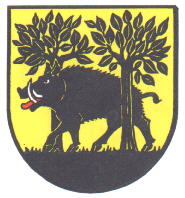Botnang: Difference between revisions
Jump to navigation
Jump to search
Knorrepoes (talk | contribs) m (Text replace - "[[Category:Stuttgart] " to "Category:Stuttgart") |
Knorrepoes (talk | contribs) m (Text replace - "'''Origin/meaning :'''<br/>" to "====Origin/meaning====") |
||
| Line 14: | Line 14: | ||
[[File:botnang.jpg|center]] | [[File:botnang.jpg|center]] | ||
====Origin/meaning==== | |||
The municipality applied for arms in 1919, but no historical arms or seals were available. The State Archives thus proposed in 1920 the above arms, which symbolise the zoo, founded in 1815 by King Friedrich of Württemberg. The zoo contained mainly local animals, especially deer and boar. <br/> | The municipality applied for arms in 1919, but no historical arms or seals were available. The State Archives thus proposed in 1920 the above arms, which symbolise the zoo, founded in 1815 by King Friedrich of Württemberg. The zoo contained mainly local animals, especially deer and boar. <br/> | ||
Even thought he municipality itself probably never used the arms, as the municipality merged with Stuttgart in 1922, the arms are used in several places in the old village. | Even thought he municipality itself probably never used the arms, as the municipality merged with Stuttgart in 1922, the arms are used in several places in the old village. | ||
Revision as of 07:30, 1 April 2012
| Heraldry of the World Civic heraldry of Germany - Deutsche Wappen (Gemeindewappen/Kreiswappen) |
BOTNANG
State : Baden-Württemberg
District (Kreis) : Stuttgart
Incorporated into : 1922 Stuttgart
Origin/meaning
The municipality applied for arms in 1919, but no historical arms or seals were available. The State Archives thus proposed in 1920 the above arms, which symbolise the zoo, founded in 1815 by King Friedrich of Württemberg. The zoo contained mainly local animals, especially deer and boar.
Even thought he municipality itself probably never used the arms, as the municipality merged with Stuttgart in 1922, the arms are used in several places in the old village.
Literature : Bardua, 1973.

